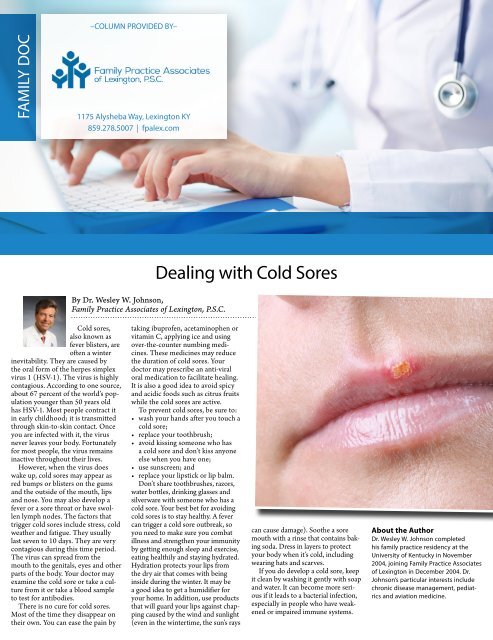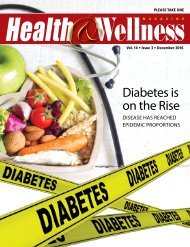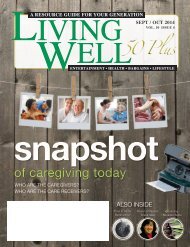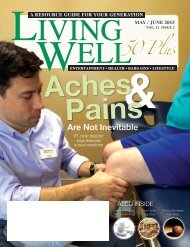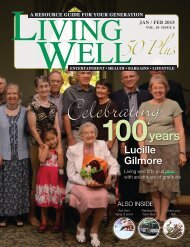You also want an ePaper? Increase the reach of your titles
YUMPU automatically turns print PDFs into web optimized ePapers that Google loves.
For advertising information call 859.368.0778 or email brian@rockpointpublishing.com | <strong>Jan</strong>uary 20<strong>17</strong> & 21<br />
–COLUMN PROVIDED BY–<br />
FAMILY DOC<br />
1<strong>17</strong>5 Alysheba Way, Lexington KY<br />
859.278.5007 | fpalex.com<br />
Dealing with Cold Sores<br />
By Dr. Wesley W. Johnson,<br />
Family Practice Associates of Lexington, P.S.C.<br />
Cold sores,<br />
also known as<br />
fever blisters, are<br />
often a winter<br />
inevitability. They are caused by<br />
the oral form of the herpes simplex<br />
virus 1 (HSV-1). The virus is highly<br />
contagious. According to one source,<br />
about 67 percent of the world’s population<br />
younger than 50 years old<br />
has HSV-1. Most people contract it<br />
in early childhood; it is transmitted<br />
through skin-to-skin contact. Once<br />
you are infected with it, the virus<br />
never leaves your body. Fortunately<br />
for most people, the virus remains<br />
inactive throughout their lives.<br />
However, when the virus does<br />
wake up, cold sores may appear as<br />
red bumps or blisters on the gums<br />
and the outside of the mouth, lips<br />
and nose. You may also develop a<br />
fever or a sore throat or have swollen<br />
lymph nodes. The factors that<br />
trigger cold sores include stress, cold<br />
weather and fatigue. They usually<br />
last seven to 10 days. They are very<br />
contagious during this time period.<br />
The virus can spread from the<br />
mouth to the genitals, eyes and other<br />
parts of the body. Your doctor may<br />
examine the cold sore or take a culture<br />
from it or take a blood sample<br />
to test for antibodies.<br />
There is no cure for cold sores.<br />
Most of the time they disappear on<br />
their own. You can ease the pain by<br />
taking ibuprofen, acetaminophen or<br />
vitamin C, applying ice and using<br />
over-the-counter numbing medicines.<br />
These medicines may reduce<br />
the duration of cold sores. Your<br />
doctor may prescribe an anti-viral<br />
oral medication to facilitate healing.<br />
It is also a good idea to avoid spicy<br />
and acidic foods such as citrus fruits<br />
while the cold sores are active.<br />
To prevent cold sores, be sure to:<br />
• wash your hands after you touch a<br />
cold sore;<br />
• replace your toothbrush;<br />
• avoid kissing someone who has<br />
a cold sore and don’t kiss anyone<br />
else when you have one;<br />
• use sunscreen; and<br />
• replace your lipstick or lip balm.<br />
Don’t share toothbrushes, razors,<br />
water bottles, drinking glasses and<br />
silverware with someone who has a<br />
cold sore. Your best bet for avoiding<br />
cold sores is to stay healthy. A fever<br />
can trigger a cold sore outbreak, so<br />
you need to make sure you combat<br />
illness and strengthen your immunity<br />
by getting enough sleep and exercise,<br />
eating healthily and staying hydrated.<br />
Hydration protects your lips from<br />
the dry air that comes with being<br />
inside during the winter. It may be<br />
a good idea to get a humidifier for<br />
your home. In addition, use products<br />
that will guard your lips against chapping<br />
caused by the wind and sunlight<br />
(even in the wintertime, the sun’s rays<br />
can cause damage). Soothe a sore<br />
mouth with a rinse that contains baking<br />
soda. Dress in layers to protect<br />
your body when it’s cold, including<br />
wearing hats and scarves.<br />
If you do develop a cold sore, keep<br />
it clean by washing it gently with soap<br />
and water. It can become more serious<br />
if it leads to a bacterial infection,<br />
especially in people who have weakened<br />
or impaired immune systems.<br />
About the Author<br />
Dr. Wesley W. Johnson completed<br />
his family practice residency at the<br />
University of Kentucky in November<br />
2004, joining Family Practice Associates<br />
of Lexington in December 2004. Dr.<br />
Johnson’s particular interests include<br />
chronic disease management, pediatrics<br />
and aviation medicine.


